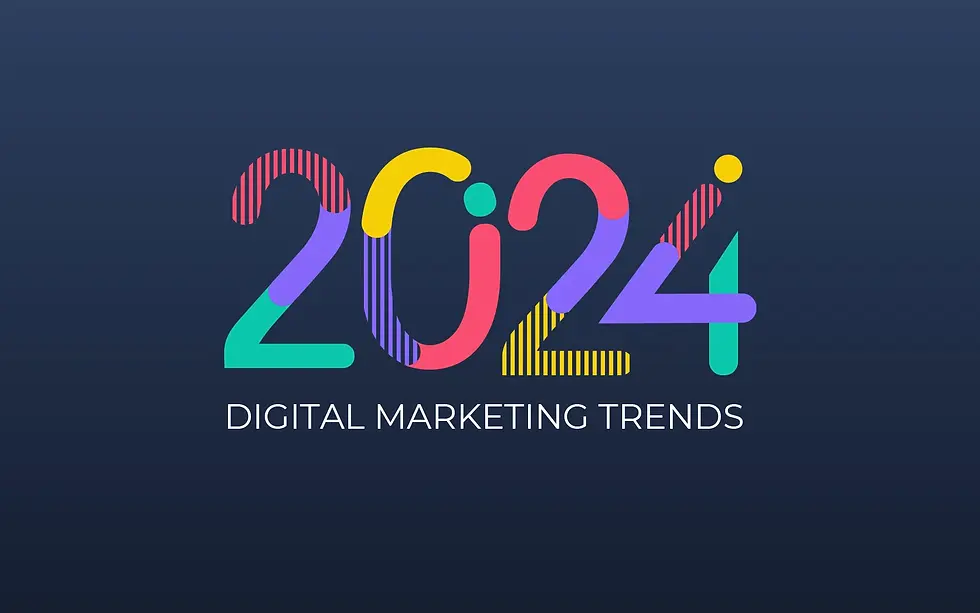Key Digital Marketing Trends for 2024
- top dawg digital
- Jul 30, 2024
- 4 min read

The digital marketing landscape is ever-evolving, driven by technological advancements and shifting consumer behaviors. As we navigate through 2024, several key trends are shaping the future of digital marketing. Staying ahead of these trends is crucial for businesses looking to maintain a competitive edge and connect more effectively with their audiences. Here are the top digital marketing trends to watch out for in 2024:
1. AI-Powered Personalization
Artificial Intelligence (AI) continues to revolutionize digital marketing, particularly through personalization. AI algorithms analyze vast amounts of data to deliver highly personalized content and experiences to consumers. This trend is evident in personalized email marketing, product recommendations, and dynamic content on websites. AI-powered chatbots and virtual assistants are also becoming more sophisticated, providing personalized customer service and support around the clock.
2. Voice Search Optimization
With the increasing popularity of smart speakers and voice assistants like Alexa, Google Assistant, and Siri, voice search is becoming a significant part of how consumers find information online. Businesses must optimize their content for voice search by focusing on natural language and long-tail keywords. Structured data and concise answers to common questions can improve visibility in voice search results, helping brands stay relevant in this growing trend.
3. Video Marketing Dominance
Video content remains a dominant force in digital marketing. Platforms like TikTok, YouTube, and Instagram Reels continue to grow in popularity, and live streaming is becoming an essential tool for engaging audiences in real-time. Short-form videos, in particular, are highly effective for capturing attention and conveying messages quickly. Brands are leveraging video marketing to showcase products, share stories, and connect with their audiences on a more personal level.
4. Interactive Content
Interactive content, such as polls, quizzes, and augmented reality (AR) experiences, is gaining traction as it offers a more engaging way for consumers to interact with brands. This type of content not only captures attention but also provides valuable insights into consumer preferences and behaviors. AR, in particular, is being used to create immersive shopping experiences, allowing customers to visualize products in their own space before making a purchase.
5. Social Commerce
Social media platforms are increasingly integrating e-commerce features, enabling users to shop directly from their favorite social apps. Instagram, Facebook, and TikTok have all introduced shopping features that allow brands to tag products in posts and stories, streamlining the purchasing process. Social commerce blurs the line between social media and online shopping, making it easier for consumers to discover and buy products without leaving the app.
6. Sustainability and Ethical Marketing
Consumers are becoming more conscious of the environmental and ethical practices of the brands they support. Sustainable and ethical marketing is not just a trend but a necessity for businesses aiming to build trust and loyalty. Highlighting eco-friendly practices, fair trade, and corporate social responsibility initiatives can resonate deeply with socially conscious consumers. Brands that genuinely commit to sustainability and transparency are likely to see increased customer loyalty and advocacy.
7. Influencer Partnerships
Influencer marketing continues to be a powerful strategy for reaching target audiences. However, there is a shift towards long-term partnerships and collaborations with micro and nano-influencers. These influencers often have smaller but highly engaged followings, making their recommendations more authentic and trustworthy. Building genuine relationships with influencers can help brands create more meaningful and impactful campaigns.
8. Privacy and Data Security
With increasing concerns about data privacy and security, businesses must prioritize transparent and ethical data practices. The introduction of stricter data protection regulations, such as GDPR and CCPA, requires companies to be more vigilant about how they collect, store, and use consumer data. Building trust through transparent data policies and giving consumers control over their information is essential for maintaining a positive brand image.
9. Omnichannel Marketing
Consumers expect seamless experiences across multiple channels, whether they are interacting with a brand online, in-store, or through mobile apps. Omnichannel marketing integrates various channels to provide a cohesive and consistent customer journey. Leveraging data and insights from all touchpoints allows brands to deliver personalized and relevant experiences at every stage of the customer lifecycle.
10. Blockchain Technology
Blockchain technology is emerging as a game-changer in digital marketing, offering enhanced transparency and security in advertising. By using blockchain, advertisers can verify the authenticity of clicks and impressions, reducing ad fraud. Additionally, blockchain can facilitate more secure and transparent transactions, protecting consumer data and ensuring trust between brands and customers.
Conclusion
As we move through 2024, these key digital marketing trends will continue to shape how businesses connect with their audiences and drive growth. Embracing these trends and adapting strategies accordingly will be crucial for staying competitive in the dynamic digital landscape. By leveraging AI, optimizing for voice search, creating engaging content, and prioritizing data security, brands can build stronger relationships with consumers and achieve lasting success.
For expert assistance in navigating these trends and implementing cutting-edge digital marketing strategies, contact Top Dawg Digital. Let us help you stay ahead of the curve and grow your brand in 2024 and beyond!













Comments